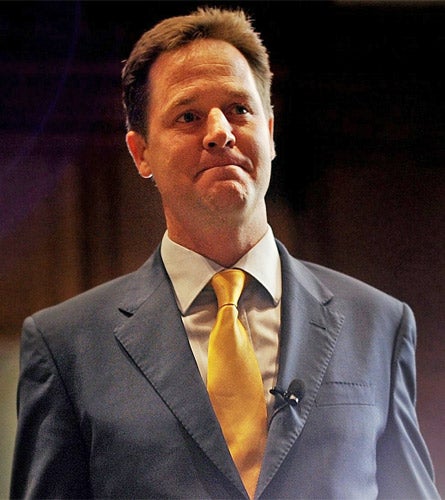Coalition ministers plan united conference front

Your support helps us to tell the story
From reproductive rights to climate change to Big Tech, The Independent is on the ground when the story is developing. Whether it's investigating the financials of Elon Musk's pro-Trump PAC or producing our latest documentary, 'The A Word', which shines a light on the American women fighting for reproductive rights, we know how important it is to parse out the facts from the messaging.
At such a critical moment in US history, we need reporters on the ground. Your donation allows us to keep sending journalists to speak to both sides of the story.
The Independent is trusted by Americans across the entire political spectrum. And unlike many other quality news outlets, we choose not to lock Americans out of our reporting and analysis with paywalls. We believe quality journalism should be available to everyone, paid for by those who can afford it.
Your support makes all the difference.The Liberal Democrats have traditionally been forced to scream – or beg – for attention when they hold their annual conference. But it could not be more different this year with an unprecedented spotlight about to be trained on the Coalition Government's junior partners.
There will be 1,600 journalists there, compared with 950 last year, and more than 6,500 people are due to travel to Liverpool this weekend, making it the largest conference in the party's history and requiring police to mount an unprecedented security operation.
But far from relishing the opportunity to put across their message, many in the party's high command are beset with worries about the event.
Yesterday in a pre-conference briefing, Norman Lamb, Mr Clegg's private parliamentary private secretary, put a brave face on the party's financial and political health, saying it was signing up more members than it was losing and that it was performing strongly in by-elections.
He said it would not be "panicked" by opinion polls, adding: "When you have to take responsibility for decisions, difficult decisions, there is a risk that the junior partner in the Coalition attracts the flak. We have got a vibrant party that has a soul and is determined to debate key issues."
Conservative and Liberal Democrat Cabinet members yesterday agreed a joint approach to the conference season that will see them mount a robust defence of the Coalition's economic plans. They cited comments such as the Police Federation's warning that reductions in police numbers would usher in a "Christmas for criminals" – a remark denounced by one government source as "inflammatory and irresponsible".
Coalition ministers will argue that the rapid action taken after the election has taken the country "out of the danger zone and towards the safety zone" by reassuring the money markets. They will also accuse Labour of "taking the country for fools" by refusing to spell out exactly how it would have implemented the £44bn savings which the party promised in its election manifesto.
In a demonstration of the new political landscape, Tory and Liberal Democrat ministers are due to attend fringe events at each other's conferences. The Conservatives Oliver Letwin, Francis Maude and Grant Shapps will all deliver speeches in Liverpool, while Danny Alexander, the Liberal Democrat Chief Secretary to the Treasury, will address the Tory faithful in Birmingham.
Liberal Democrat delegates are gathering at an anxious moment for the party, which has seen its opinion poll ratings crumble. The event should have been a celebration of Nick Clegg's achievement of steering the party to its first taste of power at Westminster for 65 years. Instead Liberal Democrat chiefs fear that coverage of the event will be dominated by a focus on criticism of the Coalition's programme.
In the main conference hall, delegates are preparing to protest over the scale of the austerity measures and to condemn Michael Gove's plans for "free schools". They also look certain to force an emergency debate on the renewal of Trident.
Around the conference fringe, left-leaning MPs and activists will also spell out their differences with their Government partners and air fears that they are being stampeded into a Tory agenda. The party's former leader, Charles Kennedy, provided a foretaste of those concerns yesterday, warning the Coalition not to "throw the baby out with the bathwater" by cutting public spending.
The conference organisers' difficulties have been compounded by Mr Clegg's planned attendance at a United Nations summit in New York next week. Instead of closing the conference with the leader's speech, he will leave the conference early, leaving a void that could be filled with reports of malcontents' disquiet over the power-sharing deal.
Party chiefs hope to tackle that problem with a series of "substantial" policy announcements by Liberal Democrat ministers including Vince Cable and Chris Huhne.
Conference flashpoints...
Spending cuts
Activists will want assurances that the austerity measures do not hit the most vulnerable groups hardest or disproportionately affect the poorest regions. Is the party being used as cover for an ideologically driven assault on Britain's public services?
School reforms
Michael Gove's education policies are anathema to many of the Liberal Democrat members who work in the public sector. The party could end up urging parents not to send their children to the "free schools" that are championed by the Coalition and its supporters.
Electoral reform
There are growing fears that next year's referendum on replacing the first-past-the-post system for Westminster elections with the alternative vote will be lost. This would risk the Lib Dem's vision being set back decades.
Trident
The Lib Dems and Tories agreed in the Coalition document to differ over replacing the Trident nuclear submarine. But few issues so graphically demonstrate the two parties' different political instincts.
Identity
Activists' greatest fear is that their distinctive identity is being submerged in the Coalition. The question is: are Lib Dem ministers doing enough to stop that happening?
Join our commenting forum
Join thought-provoking conversations, follow other Independent readers and see their replies
Comments